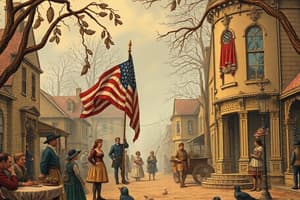Podcast
Questions and Answers
What was a significant impact of Thomas Paine's pamphlet Common Sense on the American colonists?
What was a significant impact of Thomas Paine's pamphlet Common Sense on the American colonists?
- It suggested maintaining ties with the British government.
- It initiated public debate over independence. (correct)
- It declared war on King George III directly.
- It proposed a monarchy as a solution for governance.
Why did the military situation take precedence over forming a government for the colonists in 1776?
Why did the military situation take precedence over forming a government for the colonists in 1776?
- Establishing a government was seen as unnecessary.
- They were too busy negotiating with the British.
- The colonists believed independence was guaranteed.
- A disastrous battle could jeopardize their quest for independence. (correct)
What strategic strength did the British possess at the onset of the American Revolution?
What strategic strength did the British possess at the onset of the American Revolution?
- Ability to use unconventional tactics.
- Well-trained troops and vast resources. (correct)
- Support from other nations.
- Commitment to the cause of independence.
What was the biggest problem for Great Britain following the Seven Years War?
What was the biggest problem for Great Britain following the Seven Years War?
Which of the following represents a fundamental belief of the Real Whigs?
Which of the following represents a fundamental belief of the Real Whigs?
What assumption did the British make about the conflict with the American colonists initially?
What assumption did the British make about the conflict with the American colonists initially?
What prompted France to support the American colonists during the war?
What prompted France to support the American colonists during the war?
What was a significant problem the colonists had with the Stamp Act?
What was a significant problem the colonists had with the Stamp Act?
What was the primary significance of Parliament’s Declaratory Act?
What was the primary significance of Parliament’s Declaratory Act?
What was one of the significant outcomes of the Treaty of Paris?
What was one of the significant outcomes of the Treaty of Paris?
Which problem did the United States face immediately after the American Revolution?
Which problem did the United States face immediately after the American Revolution?
How did the Townshend Duties differ from the Navigation Acts?
How did the Townshend Duties differ from the Navigation Acts?
What was one task the delegates at the Continental Congress aimed to accomplish?
What was one task the delegates at the Continental Congress aimed to accomplish?
What idea did the American Revolution help to expand regarding the United States' future?
What idea did the American Revolution help to expand regarding the United States' future?
What event is famously referred to as 'the shot heard around the world'?
What event is famously referred to as 'the shot heard around the world'?
What did the American Prohibitory Act signify?
What did the American Prohibitory Act signify?
What four fundamental rights were generally guaranteed by state constitutions?
What four fundamental rights were generally guaranteed by state constitutions?
Which power was NOT granted to Congress under the Articles of Confederation?
Which power was NOT granted to Congress under the Articles of Confederation?
Why was the government under the Articles of Confederation considered weak?
Why was the government under the Articles of Confederation considered weak?
How did Shays’ Rebellion influence Congress’s view on the Articles of Confederation?
How did Shays’ Rebellion influence Congress’s view on the Articles of Confederation?
What was Native Americans' response to the opening of the Northwest Territory to white settlers?
What was Native Americans' response to the opening of the Northwest Territory to white settlers?
Which feature was characteristic of the Virginia Plan?
Which feature was characteristic of the Virginia Plan?
What compromise resulted from the debates between the Virginia Plan and New Jersey Plan?
What compromise resulted from the debates between the Virginia Plan and New Jersey Plan?
Which statement accurately describes the key provisions of the Articles of Confederation concerning state relations?
Which statement accurately describes the key provisions of the Articles of Confederation concerning state relations?
Flashcards
Debt from the Seven Years' War
Debt from the Seven Years' War
The Seven Years' War (or French and Indian War) left Great Britain with a significant war debt which they tried to pass on to the American colonies through taxes, leading to resentment and ultimately the American Revolution.
Real Whigs
Real Whigs
The Real Whigs believed in a limited government, arguing against powerful, centralized power structures like monarchies and standing armies, advocating for the rights of individuals and local communities.
Stamp Act
Stamp Act
The Stamp Act imposed a direct tax on various documents and printed materials in the American colonies, igniting widespread protests as colonists viewed it as an infringement on their right to self-governance and taxation without representation.
Declaratory Act
Declaratory Act
Signup and view all the flashcards
How did Townshend Duties differ from Navigation Acts?
How did Townshend Duties differ from Navigation Acts?
Signup and view all the flashcards
Coercive Acts (Intolerable Acts)
Coercive Acts (Intolerable Acts)
Signup and view all the flashcards
Tasks of the Continental Congress
Tasks of the Continental Congress
Signup and view all the flashcards
Continental Congress Accomplishments
Continental Congress Accomplishments
Signup and view all the flashcards
What was the main argument of Thomas Paine's 'Common Sense'?
What was the main argument of Thomas Paine's 'Common Sense'?
Signup and view all the flashcards
Why were military matters prioritized over government formation in 1776?
Why were military matters prioritized over government formation in 1776?
Signup and view all the flashcards
What were the strengths and weaknesses of the British and American forces at the start of the Revolution?
What were the strengths and weaknesses of the British and American forces at the start of the Revolution?
Signup and view all the flashcards
What did the British initially believe about the colonists and their resistance?
What did the British initially believe about the colonists and their resistance?
Signup and view all the flashcards
Why did France join the American colonists in their fight against the British?
Why did France join the American colonists in their fight against the British?
Signup and view all the flashcards
What was the outcome of the Treaty of Paris for the American colonists?
What was the outcome of the Treaty of Paris for the American colonists?
Signup and view all the flashcards
What were the three major points of significance of the American Revolution?
What were the three major points of significance of the American Revolution?
Signup and view all the flashcards
What were the five major problems faced by the United States after the American Revolution?
What were the five major problems faced by the United States after the American Revolution?
Signup and view all the flashcards
Powers granted to Congress under the Articles of Confederation
Powers granted to Congress under the Articles of Confederation
Signup and view all the flashcards
Provisions of the Articles of Confederation regarding states
Provisions of the Articles of Confederation regarding states
Signup and view all the flashcards
Weaknesses of the government under the Articles of Confederation
Weaknesses of the government under the Articles of Confederation
Signup and view all the flashcards
Significance of Shays' Rebellion
Significance of Shays' Rebellion
Signup and view all the flashcards
Debate over representation in Congress
Debate over representation in Congress
Signup and view all the flashcards
Structure of the U.S. government under the Constitution
Structure of the U.S. government under the Constitution
Signup and view all the flashcards
Virginia Plan
Virginia Plan
Signup and view all the flashcards
New Jersey Plan
New Jersey Plan
Signup and view all the flashcards
Study Notes
Seven Years'/French and Indian War Problems for Britain
- Britain's biggest problem was debt from the war.
- Colonists didn't believe they should pay for the war's aftermath.
Real Whig Beliefs and Warnings
- Powerful government is dangerous.
- Monarch-led governments are dangerous.
- Standing armies are dangerous.
- Corrupt government can destroy representation, impose unjust taxes, or replace jury trials with arbitrary proceedings.
Stamp Act Significance
- First internal tax on the colonies.
Colonists' Perspective on the Stamp Act
- Unfair revenue measure, broad scope.
- Stamps had to be British currency (sterling).
- Violators could be tried in British courts.
- Violated colonial tradition of self-taxation.
Declaratory Act Significance
- Parliament had the power to tax and create laws in all cases.
Townshend Duties vs. Navigation Acts
- Duties were levied on British imports into the colonies instead of foreign countries.
- Intended to pay royal officials' salaries in the colonies.
Coercive Acts (Intolerable Acts) Provisions
- Forbade exports to foreign ports or provinces.
Continental Congress Tasks (1774)
- Defined grievances against Great Britain
- Developed a plan for resistance
American Prohibitory Act
- Declared war on King George III's colonies.
Significance of Lexington (1775)
- Start of the American Revolution.
- Beginning of the colonists' struggle.
Military Situation's Importance (1776)
- One disastrous battle could end independence bid.
British/Colonist Strengths/Weaknesses (Revolution Onset)
- British Strengths:* Well-trained troops, strong government, Atlantic logistics.
- British Weaknesses:* Conventional military methods were unsuited, colonial commitment to independence.
- Colonial Weaknesses:* Lack of money, adequate uniforms, military experience, and support.
British Assumptions at War Start
- Police action against unruly mobs.
- British soldiers overwhelm colonial forces.
- Clear military victory automatically secures loyalty.
French Alliance Reasons
- Colonists' victory at Saratoga (1777).
- England's growing colonial resistance.
Treaty of Paris Results
- Confirmed existence of the USA and independence.
American Revolution Significance (Lecture)
- Geographic expansion.
- Manifest Destiny.
- Expanded global trading vision (India and China)
Post-Revolutionary Problems (Five Major Issues)
- Post-war inflation.
- Soldiers owed money.
- Lack of unity.
- States printed own money.
- Land ownership disputes.
Articles of Confederation Powers (Congress)
- Declare war, make peace, make treaties, settle state disputes.
- Borrow and print money. -Requested money from states for defense and welfare.
Articles of Confederation's State Provisions
- Each state retained its independence and freedom.
- Each state had one vote in Congress.
- Any powers not given to Congress belonged to the states.
Articles of Confederation Weaknesses
- No power to impose taxes, enforce authority.
Shay's Rebellion Impact
- Led to awareness that the Articles of Confederation needed reform.
Northwest Territory & Native American Response
- Native Americans were not involved in the resulting peace negotiations.
Constitutional Debates (Virginia, New Jersey Plans, Great Compromise)
- Virginia Plan: Proposed a two-house legislature with proportional representation.
- New Jersey Plan: Proposed a one-house legislature with equal representation for each state.
- Great Compromise: Established a two-house legislature with proportional representation in the House and equal representation in the Senate.
- Crucial in debate over Constitutional representation.
U.S. Government Structure (Constitution)
- Established the structure of the U.S. government.
Federalist vs. Anti-Federalist Positions
- Federalists: Advocated for a stronger national government.
- Anti-Federalists: Supported a vision of America with strong states.
Studying That Suits You
Use AI to generate personalized quizzes and flashcards to suit your learning preferences.




